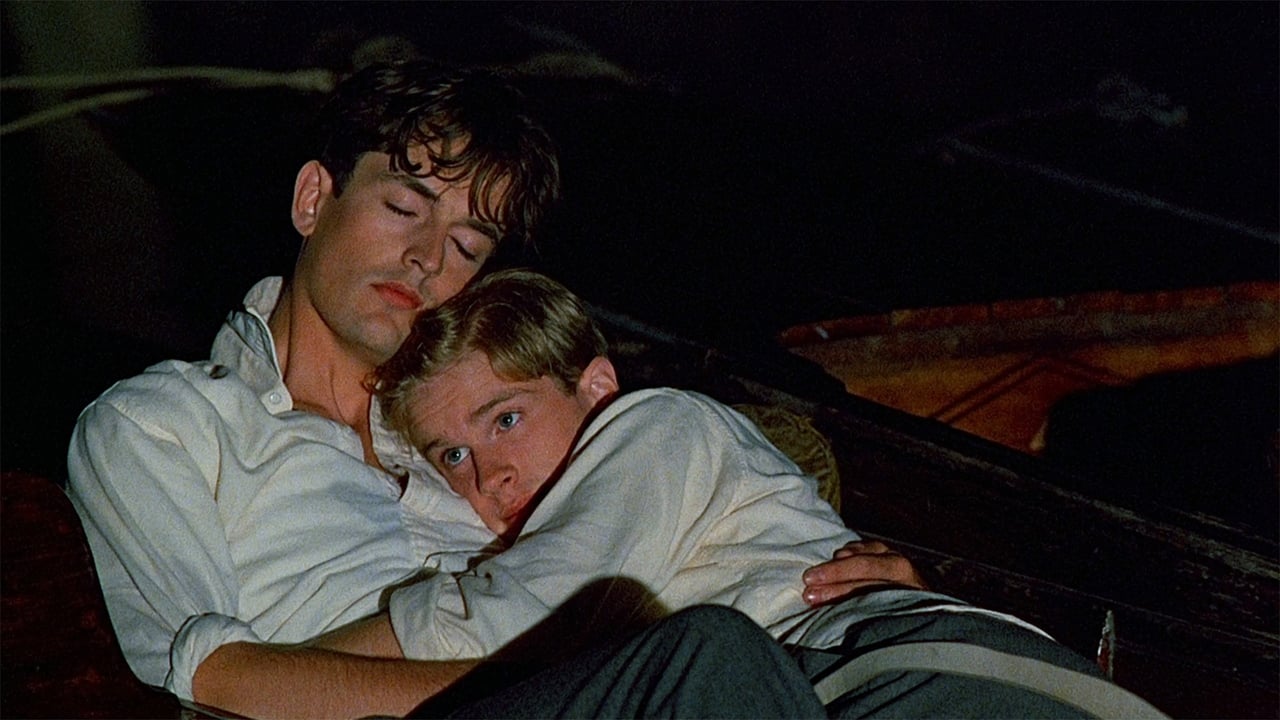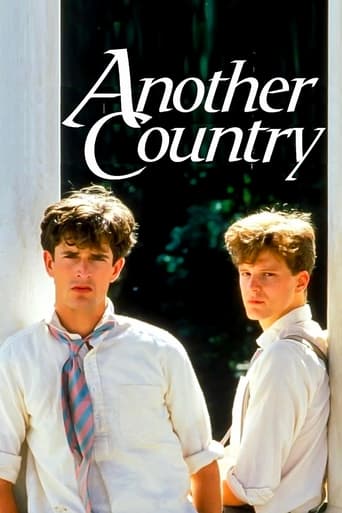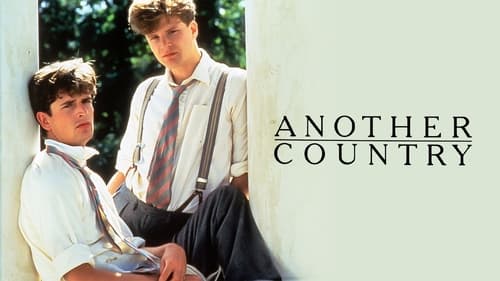



Tied for the best movie I have ever seen
Boring, over-political, tech fuzed mess
A bit overrated, but still an amazing film
While it is a pity that the story wasn't told with more visual finesse, this is trivial compared to our real-world problems. It takes a good movie to put that into perspective.
View MoreI whole-heartily concur with this particular reviewer on all points, having seen this film on several occasions over the years.However, on this occasion I am not sure why I cannot pay to stream this film to watch. As a matter of interest, for people who would like to pay to rent films, a new order seems to predominate this responsible way of watch films. I am at the moment, baffled.
View MoreAlthough the closing titles contain the standard "all characters are fictitious" disclaimer, the scriptwriter Julian Mitchell has never denied that his main character Guy Bennett is a thinly-disguised portrait of Guy Burgess, one of the notorious Cambridge spy ring who acted for Soviet Russia. The film is mostly set in an English public school during the 1930s, based on Eton where Burgess was educated. (What shocked British society most about the spy ring was not so much the treachery of its members as the fact that most of them were from well-off Establishment families and educated at the country's most prestigious schools).At the heart of the film is the friendship between Bennett and another student, Tommy Judd. Although they are very different in personality, they are drawn to one another because both, in their own way, are rebels against the system. Judd, a committed Marxist, is a rebel with a cause who despises the school and all it stands for. Bennett is a rebel without a cause whose attitudes are rather contradictory. He can see the absurdity and hypocrisy of the public school system and of the Establishment in general, but still wants to benefit from that system. His greatest ambition is to become a "god", school slang for a senior prefect, regarded as the school's social elite. Much of the plot revolves around the machinations of various senior pupils to achieve this coveted distinction; Judd is virtually alone in disdaining it. At this stage Bennett is not actually a Communist; when Judd quotes Lenin's attack on Karl Kautsky, spouting a lot of Marxist jargon in the process, Bennett replies "Oh, that's bad!", but in a sarcastic tone of voice which implies that he neither knows nor cares what Judd is talking about.Bennett is also trying to come to terms with his homosexuality. He is engaged in a sexual relationship with another boy, James Harcourt, and there are indications that he has engaged in similar behaviour with others. The school's attitude to homosexuality, in fact, is fairly schizophrenic. Bennett and Harcourt are by no means the only pupils involved in gay relationships; indeed, another boy in Bennett's house has recently committed suicide after being caught in flagrante with his lover by a teacher. The greatest concern, however, of the staff and most of the prefects is the need to avoid scandal; gay relationships are quietly tolerated provided they are kept discreet. When one prefect, Fowler, attempts to crack down on homosexuality, motivated by Puritanical religious zeal, he makes himself very unpopular with his fellows, who fear that he might uncover things best left hidden. Bennett represents a challenge to this system of organised hypocrisy, not because he is gay but because he is temperamentally incapable of discretion. The greatest sin is to get caught, because that would force the authorities to take action they would prefer to avoid.If scandal does leak out, the authorities prefer to insist that the boys were merely experimenting or going through a youthful phase. Even the otherwise nonconformist Judd takes this line. (Unlike some of his colleagues, he is firmly heterosexual and regards homosexuality with bemused incomprehension). Bennett, however, realises that being gay is an inescapable part of who he is, not a mere passing fad, and that he will never love women. The film's implication, in fact, is that Bennett/Burgess spied for the Russians not because he was a convinced Communist but as an act of revenge against the British Establishment for rejecting him on account of his sexual orientation. He never asked himself whether his sexuality would be any more acceptable to the Soviet Establishment than it was to the British one. (By the time the film was made in 1984, homosexuality had been legalised in Britain but remained strictly banned in Russia).On one level the title "Another Country" is derived from a line in the hymn "I Vow to Thee, My Country", which we hear being sung, although on another it refers to the Soviet Union, the state to which Judd and ultimately Bennett give their loyalty, with perhaps a hidden reference to Orwell's theory of "transferred nationalism"- the idea that supporters of Stalin and Soviet Russia were motivated by the same type of uncritical, unthinking nationalism as flag-waving British jingoists, with the difference that their loyalty was transferred from their own country to a foreign one."Another Country" was made by Goldcrest, the company which has become most closely associated with the great British cinematic revival of the eighties, but unlike some of their other productions it has largely disappeared from view over the last thirty years. In 1984, controversy over the spy ring was still raging. Leftists, who might under other circumstances have been sympathetic to Communism, savagely attacked the spies as prize examples of upper-class treachery and corruption, whereas some rightists, most notoriously Peregrine Worsthorne, attempted to defend them on the grounds that loyalty to one's beliefs could be more important than loyalty to one's country.Since the end of the Cold Way we no longer care as much about the Cambridge Spies as we once did, which may explain why "Another Country" can seem unfashionable these days. It is, however, a very good film, distinguished by an excellent performance from a young Colin Firth as Judd, surprisingly likable despite his extremist views, and an even better one from Rupert Everett as the floppy-haired, nonchalantly rebellious yet secretly vulnerable Bennett. It also has a lot to say about matters of perennial importance- loyalty to country, loyalty to friends, political idealism and the rights of sexual minorities. An intriguing and thought-provoking film. 8/10
View MoreGuy Burgess became a communist, spied for the Soviet Union, and lived there for the rest of his life after he was found out. Why? Because, as far as we can tell from this movie, he was a homosexual, and British law was extremely harsh toward male homosexuals. That makes no sense at all. Soviet law was also extremely repressive against homosexuals in those days. No one would have chosen the Soviet Union because they thought it was more hospitable for gays. Since Guy Burgess was a real person and this film is based on his life, he must have had some other reason for becoming a communist (he wasn't one in his school days) that has nothing to do with his sexual orientation. What was it? The movie doesn't tell us.
View MoreForget the prologue which preludes the long flashback which is the core of the movie.First scene:in a room,two boys make love while,in the main courtyard of the posh school (Eton?),a ceremony commemorates the dead soldier of WW1,with pump and circumstance:the two bedrocks of the family, Army and Religion taking in hand the third one:School.Behind these walls,inside these venerable buildings,mortal hatred ,intolerance and repression are looming.Outside,the splendid landscapes are unchanging,particularly this quiet river which comes back as a leitmotiv.And most of the students wants to keep the world as it is,because they know they are part of the privileged few.Their studies are a mere rehearsal of their life-to-be. Becoming a prefect,what a feat! Being called "god" what a honor! Being able to push the others out of your way,that makes you a man!Two young men refuse the rules of the game:the first one ,Tommy (a good Colin Firth),the most loyal character of a rather obnoxious. gathering.He sticks to his ideals,and he will die for them.He believes in Marx and in Stalin(we're in the thirties ) ;he would never betray anybody,and the audience sides with him most of the time. The second one ,Guy,(Rupert Everett at his best)is a gay,in love with a younger pal.He,too,rebels against this rigid institutions,but he's more complex:actually he tries to become a prefect and then a god,because he has kept his ambitions and he would easily opt for a compromise solution.He could but he will not..Homosexuality,when it's secret is no problem for the bourgeois society.Guy's character will mute and finally he realizes that he cannot live in the shadow.That's his downfall.No commies,no gays can be part of the crème de la crème.The posh school reputation,once the non-straight ones(in the general sense of the word)are eradicated,can sleep the sleep of the just.Sometimes compared with Lindsay Anderson's "If"(1970),its atmosphere is drastically different though :there's no dreamlike sequences here,no madness.It rather recalls "der junge Torless" (Schloendorff,1966)and it might have influenced James Ivory's "Maurice" (1986). An overlooked important movie.
View More